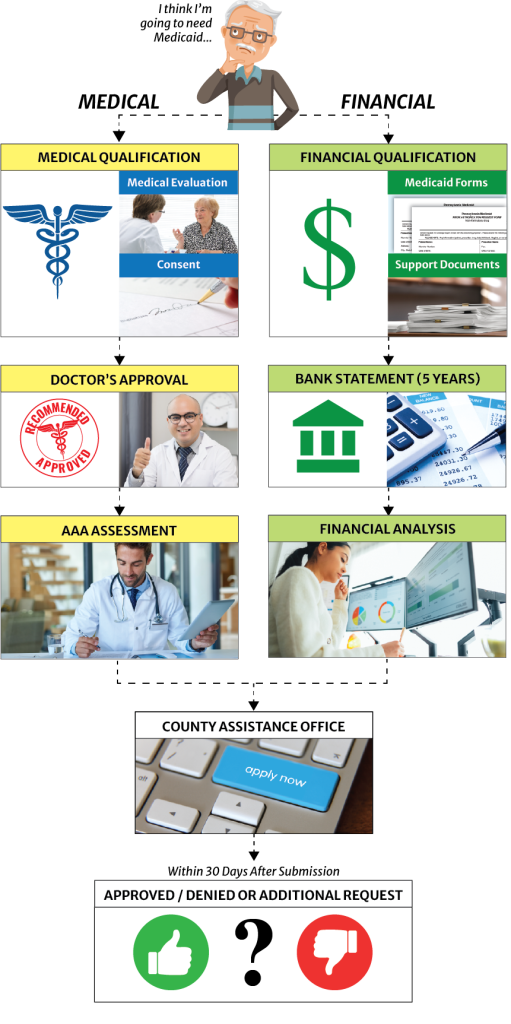Asset preservation is a strategic approach to safeguarding one’s financial resources and property, ensuring that they are efficiently managed and protected for the future. In the context of Medicaid planning, preserving assets becomes particularly significant. Medicaid eligibility often involves stringent financial criteria, and without careful planning, individuals may find themselves at risk of depleting their assets to qualify for benefits. Establishing a comprehensive asset preservation strategy not only helps navigate the complex landscape of Medicaid but also ensures that individuals can access the necessary long-term care without jeopardizing their financial well-being.
Medicaid is a vital resource for individuals requiring long-term care, but navigating its intricacies can be challenging. Asset preservation, in the context of Medicaid, involves proactive steps to structure financial holdings in a way that complies with eligibility requirements while retaining value for the individual or their heirs. Mittman Law specializes in providing guidance on asset preservation and Medicaid planning, offering personalized strategies to help individuals qualify for Medicaid benefits without depleting their life savings. By understanding the intersection of asset preservation and Medicaid, individuals can secure their financial future while accessing the essential care they need in the later stages of life.
Certified Medicaid (MA) Planning for long-term care Medicaid coverage, specializing in crisis planning (immediate MA) as well as pre-need planning (future need for MA).
Protect assets and still qualify for Medicaid. If your estate is in excess of $100k and there is a need for long-term care now or in the near future for you or your spouse, contact us today for a consultation.

Long-Term Care Medicaid (LTC MA): Assistance with skilled care and medical expenses based on financial and medical need. Must qualify for LTC MA financially (below asset limit) and there must be a medical need approved by a physician (rehab., 24/7 supervision, assistance with daily living activities).
Community Spouse (CS): The spouse that remains in the community (at home) and does not require Medicaid coverage.
Institutionalized Spouse (IS): The spouse that is in a nursing facility and requires Medicaid coverage.
SNF: Skilled nursing facility.
CCRC: Continuing care facility offering all levels of care (indp. living, asstd. living, personal/memory care, skilled care). Medicaid coverage only applies to skilled care.
Medicaid Provider: Nursing facility that accepts LTC Medicaid. Not all nursing facilities accept Medicaid, you must confirm provider status prior to applying for Medicaid. There is no Medicaid coverage for assisted living facilities, memory care units or personal care units. L TC Medicaid only covers skilled nursing facilities that are MA providers.
Medical Evaluation: Physician’s evaluation of applicant to determine medical need for long-term care in a skilled nursing facility. This is typically completed by the nursing home, when L TC MA is requested.
Level of Care Determination: This is part of Medicaid’s medical qualification process. The county’s Aging Adult Services dept. reviews the medical evaluation and completes their own assessment to determine if long-term or short-term skilled nursing care is necessary. The nursing home will forward a copy of the Medical Evaluation to Aging Adult Services and request a level of care determination.
Spend-Down: The amount of assets (funds) that must be spent on qualified MA expenses prior to MA approval.
Resources: Total asset value; includes assets for both spouses regardless if only one spouse is applying for MA.
Excess Home Equity Limit: Although when applying for Medicaid, the home is an exempt asset until sold, there is a home value exemption limit of $713k [PA2024J and changes annually. This means that any amount over the exemption limit will be considered an asset.
Cash Value (CV) of Life Policy: The amount you would receive if you terminated an existing life insurance policy. This amount is considered an asset when applying for Medicaid. However, there is a $1 k disregard.
Face Value (FV) of Life Policy: The amount the beneficiary would receive when the insured person passes.
Applicant’s Maximum Protected Share: The amount of total assets the applicant is permitted to keep when qualifying for Medicaid. This amount is based on total monthly gross income; Max. $Bk if gross income is under $2,829.00 [PA2024J month, or Max. $2.4k if gross income is $2,829.00 (PA2024J month or higher. This income amount changes annually.
Spouse’s Maximum Protected Share: The amount of total assets the community spouse (CS) is permitted to keep when qualifying the institutional spouse (IS) for Medicaid coverage. This amount is 50% of total assets (excluding the home, 2 autos and CS’s IRAs) not to exceed $154.1 k [PA2024J or a minimum of $30.Bk [PA 2024]. This only applies to the initial application process for the IS.
Spouse’s Maximum Monthly Needs Allowance (MMNA): The amount of the IS’s monthly income the CS can keep to assist with on-going home expenses. This amount is based on both the CS’s gross income and total home expenses. Only certain home expenses apply to this calculation (i.e. mortg./rent, taxes, home insurance, heating and utilities). Currently the maximum MMNA is $3.Bk mo. [PA 20241 and changes annually.
Cost-of-Care: When receiving Medicaid coverage, the applicant’s income is payable to the nursing home, less allowable deductions. This is the amount the applicant is responsible for paying each month and is based on their gross income, less healthcare premiums, personal needs allowance and any applicable spousal allowance (MMNA).
Personal Needs Allowance: This is a $45.00 [PA 20241 monthly allowance that the applicant is permitted to keep from their monthly income to cover any misc. personal needs expense. This amount is deducted from their cost-of-care and will accrue monthly and is considered their asset.
Redetermination: This is the annual renewal for Medicaid coverage. On the anniversary of the original Medicaid approval, you will be notified by the county to complete another application (PA600) and provide current bank statement for any accounts in the IS’s name, including joint accounts (50% IS’s share for joint accts.). Total assets in IS’s name must remain below their maximum protected share ($8k or $2.4k [PA 2024], based on gross income). Any overage will constitute another spend-down prior to renewal. The nursing home can assist with the renewal process.
Estate Recovery: After the passing of the IS, Estate Recovery will issue a notice to the POA or responsible party, requesting bank statements reflecting the balance in all IS’s accounts on the day of their passing. They will allow for deduction of final expenses, but any remaining funds are subject to the state’s recovery to reimburse Medicaid for the expense paid on the IS’s behalf.

Have additional questions? Feel free to contact Mittman Law. We stand ready to help.
Copyright © 2024 mittmanlaw.com Website Design and Marketing By IQnection – A Digital Marketing Company